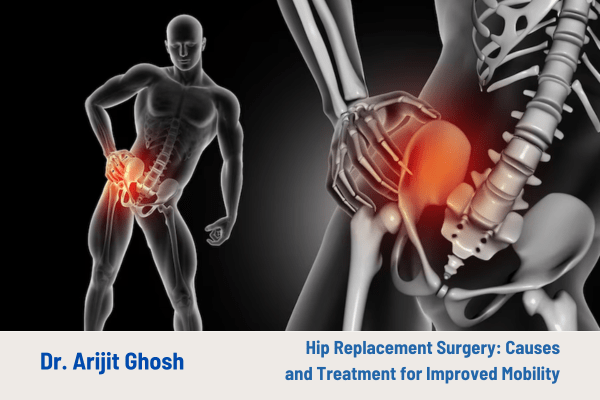Introduction: Hip replacement surgery, also known as total hip arthroplasty, is a highly effective procedure for individuals with severe hip joint damage or debilitating hip pain. In this blog the Best Hip Replacement Surgeon in Durgapur aims to shed light on the main causes that may necessitate hip replacement surgery, providing insights into the condition and the treatment option that can restore mobility and alleviate pain.
The Main Causes for Hip Replacement:
- Osteoarthritis: Osteoarthritis is the most common reason for hip replacement surgery. It occurs when the protective cartilage in the hip joint gradually wears down, leading to bone-on-bone friction, pain, stiffness, and limited mobility. Osteoarthritis typically affects older individuals, although it can also result from joint injuries or genetic factors.
- Rheumatoid Arthritis: Rheumatoid arthritis is an autoimmune disease that causes chronic inflammation in the joints, including the hip joint. Over time, the inflammation damages the joint tissues, resulting in pain, swelling, and joint deformity. Severe cases may require hip replacement surgery to restore joint function and alleviate pain.
- Hip Fractures: A hip fracture is a serious injury that often occurs in older adults due to falls or accidents. When the hip bone breaks, it can significantly impair mobility and cause severe pain. In some cases, particularly with displaced or complex fractures, hip replacement surgery may be necessary to stabilize and restore the hip joint.
- Avascular Necrosis: Avascular necrosis, also known as osteonecrosis, is a condition that occurs when there is a lack of blood supply to the hip joint. Without proper blood flow, the bone tissue deteriorates, leading to hip joint collapse, pain, and limited movement. In advanced stages, hip replacement surgery may be the best option to restore hip function.
Conclusion: Hip replacement surgery is a highly effective treatment option for individuals suffering from severe hip joint damage or debilitating hip pain. Whether caused by osteoarthritis, rheumatoid arthritis, hip fractures, or avascular necrosis, these conditions can significantly impact mobility and quality of life. By undergoing hip replacement surgery, individuals can regain their ability to move comfortably, alleviate pain, and enjoy an improved quality of life. If you are experiencing persistent hip pain or impaired mobility, consult with an orthopedic specialist to determine if hip replacement surgery is the right treatment option for you.
